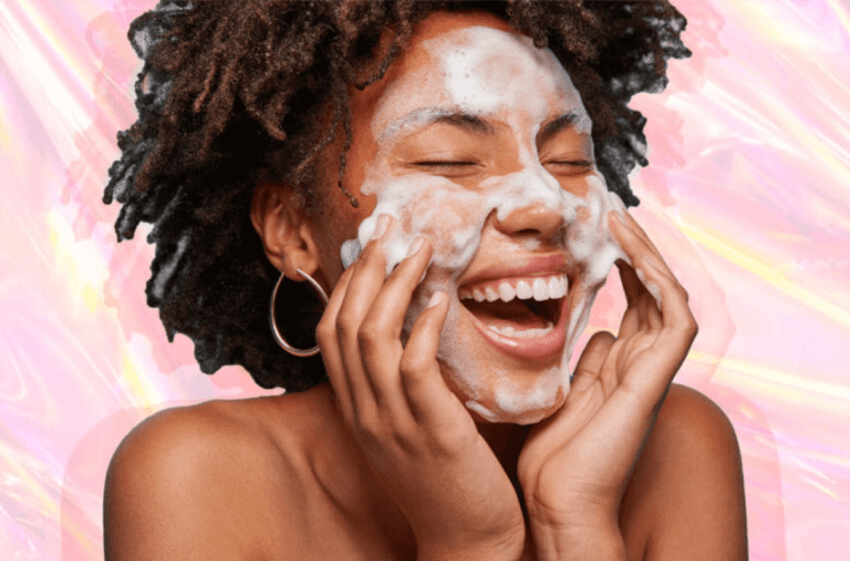Skincare Facts That Might Even Surprise You Skincare Gurus!
 via Giphy
via Giphy
From the ideal amount of SPF you should apply every day (and how often!) to which ingredients can help for certain complexion concerns, many of us are skincare smarty pants these days. Want to test your knowledge? Read through these skincare facts and let us know which ones you knew, and which were a complete surprise!
1. Some Sun Damage Doesn’t Show Up Until Decades Later
Sunburns tell us right away whether we’ve been exposed to the sun and have caused damage. However, deeper damage caused by sun exposure often doesn’t show up until many years – sometimes decades – later. Damage includes sunspots, wrinkles, fine lines, and skin laxity, and the more unprotected exposure you get, the worse these things will be later. Check out these sun myths here and find our fave sunscreens here.
2. Retinoids Don’t Thin Your Skin
There’s a common myth out there that says retinoids “thin” your skin since they come with side effects like redness, peeling, and sun sensitivity. That’d be a false assumption! Retinoids can actually have the opposite effect by stimulating cells to grow better and stronger.
“They may gently exfoliate the top layer of your skin, but they are working beneath to help your skin cells grow more normally,” explains Dr. Karan Lal, a board-certified dermatologist at Schweiger Dermatology Group. “They also stimulate collagen to be produced, which over time will increase your skin’s thickness.” Read up on more retinol myths here.
3. You Can Still Burn Sitting Under a Sun Umbrella
Don’t get us wrong. Sitting in the shade is a great choice when chilling (or sweating!) outside. However, don’t let an umbrella – or even a hat – fool you into thinking you’re protected from the sun. You can still get burnt, so make sure to slather that sunscreen.
Posts You'll Love:
4. Antiperspirant and Deodorant Aren’t the Same Thing
 via Giphy
via Giphy
We tend to use the words antiperspirant and deodorant interchangeably, but the two aren’t quite the same. In fact, depending on your specific needs you may prefer one over the other.
“Antiperspirants often have agents, such as aluminum, that are used to plug up sweat glands and prevent and reduce sweat production,” notes Dr. Lal. “These are often coupled with fragrances to help you smell better. On the other hand, deodorants are used to help you smell better but do nothing at reducing or preventing sweat production.”
5. Some Beauty Supplements Can Make Acne Worse
There seems to be a beauty supplement for practically everything! From gummies to vitamins to bars, powders, and drinks, many of these supplements can be beneficial. However, if you struggle with acne then those formulated with biotin can potentially make matters worse.
“Biotin increases cellular turnover which is typically great for healthy hair, skin, and nails. However, acne-prone individuals are already struggling with an overproduction of skin cells, so increasing this production works against those experiencing acne,” explains Alex Hernandez, a licensed esthetician at Face Reality Acne Clinic.
6. UPF Clothing Has a ‘Shelf Life’
Wearing Ultraviolet Protection Factor (UPF) clothing can help shield your skin from sun damage. However, it’s important to note that the UPF rating degrades with time and, eventually, the protection completely fades away. Generally speaking, UPF clothing lasts about two to three years when washed as per the item’s direction.
7. Your ‘Clean’ or ‘Natural’ Skincare Products Might Be Causing Breakouts
Clean, natural, and organic skincare products are super popular right now, and many of them are amazing. However, some natural ingredients can actually irritate sensitive skin or lead to breakouts.
“One of the best things someone with acne-prone skin can do for their skin is avoid pore-clogging ingredients,” says Hernandez. “Many natural products can be problematic for acne, such as coconut oil, algae extract, carrageenan (red seaweed), chlorella, and shea butter.”
Some essential oils can also cause irritation on sensitive skin, especially when they aren’t diluted properly. When in doubt, ask your dermatologist or doctor about what ingredients are best for your skin.
Did you know any of these skincare facts? Or were they all news to you? We want to hear which one surprised you mos in the comments!























Leave a comment